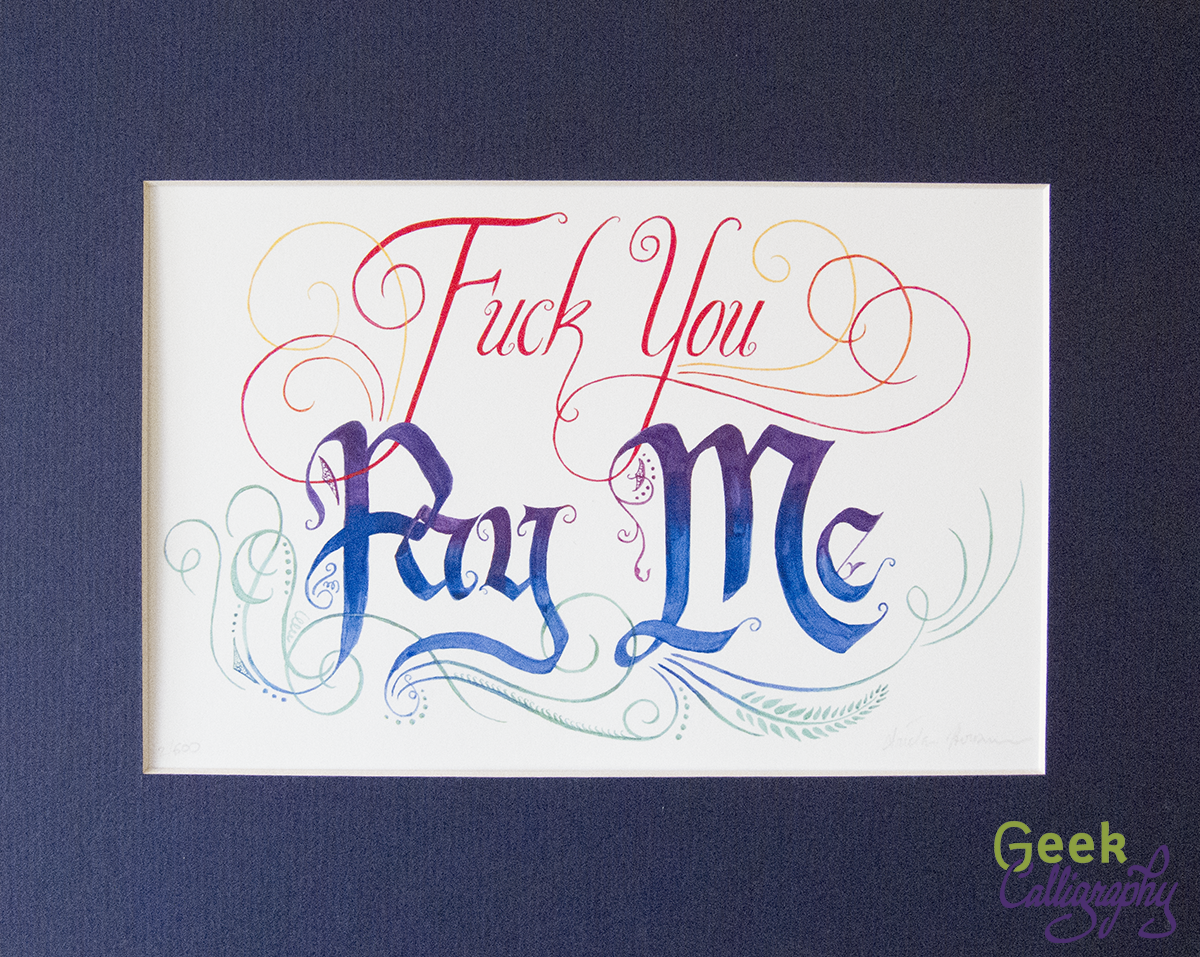by Ariela
Two years ago I wrote this post. Sadly it is still relevant and in the intervening two years I have only become angrier and more disillusioned by the evils of the Capitalist machine and all the other -isms that tend to come bundled with it as a package deal. I'm a member of a labor union in my day job and the hard limit on the number of hours I work thanks to that union (and the organized workers' lobby before them) is what allows me to pursue my art; without it, I am certain my job would gobble every hour I could give and demand more.
So drink a toast (doesn't have to be alcoholic) to the workers and activists of yesterday, today, and tomorrow, remember that something you love is still labor, and get over the idea that labor unions are only for blue collar jobs (and for pete's sake, recognize that blue collar jobs are very worthy of respect).
Image reads "I am an artist. This does not mean I will work for free. I have bills just like you. Thank you for understanding.
Image found on thephotographer4you.com
"The Starving Artist trope needs to DIAF."
I have been having the same, or similar conversations, in various forms, a lot of late on social media. So I decided to write about it at more length than I can in 140 characters, even in consecutive tweet. The topic is only somewhat related to Labor Day, not being about an Artists' Guild or other organized labor movement. But it is about recognizing the labor of artists and valuing it properly, so I thought this would be an appropriate time to post about it.
You probably know the trope of the Starving Artist; it's quite common in American culture. It's the one that says that artists almost never make enough money to make ends meet and that aspiring artists have no sense of practicality and make no plans to support themselves while they blithely pursue their art. This trope needs to Get Gone.
The Starving Artist trope was popularized during the Romantic era in Europe and America, which peaked around 1800-1850. In America, it had a large overlap with the Bohemian movement. Both of these groups valorized the idea of devotion to art - be it writing, visual arts, music, etc. - to the exclusion of all else, particularly material concerns. In these environments, the Starving Artist was an aspirational model, not a negative image.
The 1980s and 90s saw a bunch of movies, TV shows, songs, and other artistic projects showing the young artistic hopeful arriving, usually in NYC or LA, with just a suitcase and a few dollars in their pocket, also presenting this image in a positive light. Jonathan Larson's musical Rent, based strongly on Puccini's Romantic-era opera La Bohème, was probably the pinnacle of this trend, though I'm sure some people would put in a word for "Don't Stop Believin'" by Journey.
The evil counterpart of the Starving Artist is the Sellout, the person who has decided to abandon their artistic dream in favor of creating Extruded Art-like Product in exchange for money.
The stereotypes of the Starving Artist and the Sellout combine to create a double-bind of expectations for artists. Artists are starving, so if you want to be an artist, the immediate assumption is that you are an impractical flake with your head in the clouds and no economic sense. If you are already working as an artist and have the audacity to require payment for your work, you must be a greedy Sellout and your art can't possibly be good enough to be worth your quoted rate. Artists are "right-brained" people, so they don't pursue their careers logically and you can't possibly have a realistic plan or expectation of how hard you are going to have to work. And if you have a day job and pursue art on the side, why are you demanding to be paid for your hobby?
This is galling enough on its own, but even moreso when compared with the treatment of another group of creative dreamers in America: "entrepreneurs." Wikipedia defines Starving Artist as "an artist who sacrifices material well-being in order to focus on their artwork. They typically live on minimum expenses, either for a lack of business or because all their disposable income goes toward art projects. " But this description could also be applied to an entrepreneur in the throes of starting up a business. Startups have a high rate of failure, but we don't have a derogatory "Starving Entrepreneur" trope; in fact, people who do that tend to be lauded by the American capitalist machine. And I don't buy that this is due to the newness of entrepreneurship compared to art - the Romantic period that saw the birth of the Bohemian ideal was in large part a response to the Industrial Revolution, so the tension between these two groups goes back plenty long.
Someone who lives on ramen while working on the next big app, or mortgages their house to finance their restaurant, or works at a day job and then codes all night, etc., is considered "goal oriented," or at least they are if they succeed. We don't tend to hear about failures because they don't match the cultural narrative surrounding entrepreneurs and The American Dream. Artists who live meagerly are derided for "not having a real job," or living in an "unsustainable way;" those of us who work a day job are frequently condescendingly applauded for recognizing that our art will never be a going concern. Our failures are incorporated back into the cultural canon and our successes are forgotten because they don't fit the preconception of the Starving Artist. It's confirmation bias at its most basic.
This boondoggle of unrealistic and conflicting expectations is inextricably tied to and exacerbated by the way that our society values art. Or rather, the way that it doesn't value art. Art is seen as unnecessary, something not worth spending large amounts of money to obtain, or only worth spending top dollar for if one is so rich that one simply has nothing better to do with that money. I'm including more than just graphic arts in that estimation. Music, novels, theater, dance, and other media are similarly denigrated. One might think that wider access to the arts, through recording, scanning, printing, streaming, and other reproduction technology, might give people across class lines a greater appreciation for them and increase the number of people who understand their worth; alas it is not so. If anything, I suspect that it has further devalued them by creating false expectations about the cost. When art could only be afforded by the wealthy, of course it was expensive to produce; but when anyone can buy a poster, it's an huge sticker shock to encounter custom art prices. People who aren't in the habit of commissioning work don't think about the fact that the cost of production, including the artist's time, is amortized over the entire print run/album run/clothing line/etc. Sticker shock is normal, and I don't resent the clients who hear my breakdown of costs and expected labor time and say, "Ok, wow, that's out of our price range, but thanks for your time!" I also don't mind the ones who ask what the options are to cut the costs. It's the ones who get angry when I tell them my prices who are the problem. (Terri deals with most of this as part of general administravia, so I get off easy in this department.)
I am far from the only one who experiences this problem. Plenty of people attempt to get artists to do work on the grounds that it will be a good portfolio piece, or that the project will bring them publicity. The twitter account @ForExposure_txt documents some of the egregious examples of this trend. Another common trend is the non-profit that asks artists to donate their work "because it's for a good cause!" but would never dream of asking their plumber to do likewise. People who accept the quoted prices of consulting firms without a blink try to bargain artists down. The perceived valuelessness of the time and work of artists is, I suspect, one of the factors that causes Patreon to be so much more contentious than other crowdfunding platforms, like Kickstarter and GoFundMe. A society that derides us for not being able to support ourselves through our art and then turns around and demands that we work for free or insultingly low rates is hypocritical and sick. Our lovely capitalist machine demands that far too many people in a variety of jobs work below the poverty line, but what I am addressing here is the particular moral outrage expressed at artists who have the gall to say that they deserve to get paid, not just be snivellingly grateful for whatever pennies get tossed our way by noble and beneficent people with "Real Jobs."
Artists know our vocation takes an enormous amount of hard work, dedication, and perseverance. We're not in denial about this. For some of us this means we work a day job while pursuing art at night and on the weekends, sometimes for a few years, sometimes for all our working lives. For some of us it means paring away our expenses until we can live within our earnings as artists. For many it is a combination of both. We do this so that we can produce the art we love, which we hope you will love, too.
Artists make things that are beautiful, profound, disturbing, thought-provoking, challenging, and sometimes things that exist just to make you happy. We deserve respect for this work. And we deserve to get paid.
And the Starving Artist trope, which tells a story that we deserve none of this, needs to die in a fire.
Did you like this post? You might like this product:
Sometimes profanity is required. When someone asks you to work "for exposure," for example. Or for "portfolio development." Or tries to haggle you down from your stated prices by trying to convince you that you're not actually that good.
Remind yourself to stand firm and insist on being paid what you are worth with this print. Beautiful letters and graceful flourishes deliver a blunt message with class.
Available in three sizes. All come with a blue mat and ship flat.


